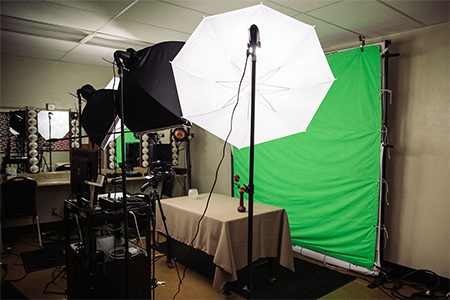ASU Music Theatre and Opera is adapting to the rapidly changing performance world by incorporating technology to enable live performances, while at the same time addressing issues of systemic racism and inherent bias in musical theater and opera. Striving to diversify, this year’s season is a work in progress and aims to ensure at least half of all presented works are by women and people of color.
“We worked with our faculty and students to identify pieces and projects that speak to the here and now,” said Brian DeMaris, artistic director of Music Theatre and Opera and associate professor in the School of Music, Dance and Theatre. “These are projects that can be achieved safely amidst the pandemic and are projects that honor our commitment to diversity, equity and inclusion, and a reinvestigation of all we do centered on the important practice of anti-racism in theater.”
The creative team used an abbreviated season selection process to create projects that could unfold entirely online or in-person, and the production process has the potential to rehearse entirely online and move to in-person at any point.
Music Theatre and Opera’s season kicked off in the fall with the virtual production “Speed Dating Tonight!," directed completely online with Janine Colletti via Zoom. Colletti, with home bases in the metro-NYC area and in Los Angeles, was on the West Coast for the rehearsal process.
“Because of the unique structure of ‘Speed Dating Tonight!,’ where the order and the selection of the songs are up to the creative team, and due to the nature of how we filmed it, I was able to craft a show around the performances of the actors which, outside of devised theater, is pretty unheard of in the narrative musical theater realm,” said Colletti.
Individual performers had initial rehearsals via Zoom with Colletti and music director Randi Ellen Rudolph; Colletti would break down the songs as scenes and Rudolph would prepare them musically. After the first round of private Zoom coaching, the cast coached with both Rudolph and Colletti simultaneously, and members of the cast who are in group songs would tune into the same Zoom room.
Each cast member had the option to come in and sing safely in the Music Building or through Zoom. Students who filmed on campus came to one of the three sets built on campus to film their portion of the show, which was then edited to make one cohesive show.

The audio technology set-ups in the Music Building enabled live accompaniment with no delay while the pianist was in one room and the singer was in a separate room. Duets and scenes were filmed at the same time, with each singer in a separate recording studio.
“’Speed Dating Tonight!’ was such a great show because it allowed for flexibility in how you build the narrative,” said media designer Kristen Peterson, who is the lighting/video/audio supervisor for the Phoenix Theatre Company. “The composer Michael Ching worked with us to create a unique version that was special to ASU Music Theatre and Opera and our community here.”
Music Theatre and Opera’s complete fall season included “Lizzie (The Musical)” by the Student Lab; the Alumni Cabaret, which raised over $5,000 for scholarships for students of color; the Holiday Cabaret; and “Opera Under the Stars,” which enabled 30 students to perform live outdoors for a limited audience over multiple evenings.
Select past events are available on the Music Theatre and Opera Vimeo channel.
For the spring season, the first public performance will be “Runaways,” written by Elizabeth Swados and directed by Toby Yatso, with musical direction by Mario Yniguez and choreography by Hannah Victoria Thomas. The show, which was recorded outdoors in November, will stream online.
Additional projects include a virtual student-led “Color Cabaret” in February to continue to raise scholarship funds for students of color and a series of small-cast, one-act operas and musicals, recorded and streamed and with limited in-person audiences as possible. All productions will be performed with masks and social distancing.
“We are also planning to continue our traditions of developing new work, including through our partnership with the Phoenix Theatre Company,” DeMaris said. “Our senior musical theater cabaret will be virtual as well, enabling students to perform online for agents from across the country.”
Details of each project will be announced one to two weeks prior to each performance to remain most adaptable.
“This fall season has absolutely been a teaching moment for all of our students,” DeMaris said. “The new modalities of delivery already existed before the pandemic, but they are now among the tools performers are expected to have and educators are expected to deliver. We have all learned a great deal about technology and mediums we have not worked in previously, and going forward, that knowledge is standard fare in any performer's training.”
More Arts, humanities and education

From ASU to the open road: Alumna Gabriella Shead builds a career behind the scenes of Broadway tours
For ASU alumna Gabriella Shead, a career in the theater isn’t about taking center stage — it’s about making sure everything…
Canon brings ‘Star Wars’ cinematographer to inspire Poitier Film School students
David Klein never had a mentor.He was scrappy — and lucky — enough to succeed without one as a career cinematographer. His…

Illuminating the season: How a business professor turns holiday lights into lessons on creativity and sustainability
On a December night in Chandler, Arizona, Kevin Dooley’s house doesn’t just twinkle. It beams like a beacon at the end of…
